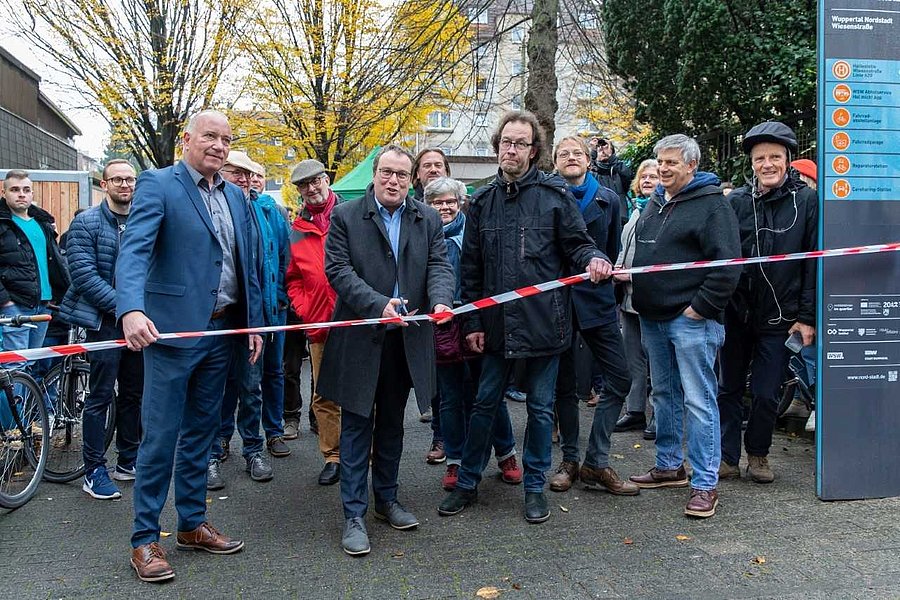Milestone reached in the "MiQ - Mobilstationen im Quartier" research project

Photo: Max Höllwarth
The new Mobilstation Wiesenstraße was handed over to the public for use on 29 November 2022 by Oliver Krischer, Minister for the Environment, Nature Conservation and Transport of the State of North Rhine-Westphalia, together with the City of Wuppertal's Department for Building and Climate Protection, Arno Minas, and District Mayor Thomas Kring in the Mirke neighbourhood. Central elements of this mobile station are a bicycle garage for 12 (e-)bikes and 6 cargo bikes, three parking spaces for car-sharing vehicles and a direct connection to public transport. "Wuppertal is a pioneer in bringing the mobile stations to the neighbourhoods," the minister emphasised. "It is something new that is being created in Wuppertal."
This means that a major milestone has been reached in the ERDF project "MiQ - Mobilstationen im Quartier" (Mobile Stations in the Neighbourhood), which has been running since November 2021 and is funded by the state and the EU.
In this joint project, the Wuppertal Institute, the Bergische Universität Wuppertal, Neue Effizienz gGmbH and the association Unternehmer/innen für die Nordstadt e.V. are looking into the extent to which mobile stations can relieve the street space of cars and delivery traffic and at the same time improve the mobility of residents. "Mobile stations are an important component of the transport revolution. They make sustainable mobility easier and more attractive because they bundle different mobility services in one place," say Thorsten Koska and Prof. Oscar Reutter from the Wuppertal Institute.
In an extensive participation process, the residents were involved in the search for a location as well as in the equipment of the station. "We were amazed at how much positive interest we encountered. Two well-attended neighbourhood conferences, countless conversations and interviews made the needs of the residents clear and led to concrete changes in the plans," says Thomas Weyland from the district association Unternehmer/innen für die Nordstadt e.V. "For example, the bicycle garage was expanded by 6 parking spaces for cargo bikes compared to the original planning.
The many suggestions from the neighbours to expand the station to include other functions such as parcel stations or repair facilities show that a possible expansion into a neighbourhood hub is the result of a concrete demand. The ideas were also further developed in expert workshops with participants from all over the country, especially with regard to new types of operator models.
"Experience from other federal states shows that further service functions often fail due to a lack of funding. Nevertheless, we are optimistic that the developed blueprints for rolling out mobile stations and neighbourhood hubs can be implemented. This is especially true if they involve not only the public sector but also local companies as facilitators," says Jochen Stiebel from Neue Effizienz gGmbH.
Prof. Dr.-Ing. Ulrike Reutter from the Chair of Public Transport Systems and Mobility Management at the University of Wuppertal praises the excellent cooperation with all project participants: "The approval and willingness to cooperate of the Elberfeld district council, the Wuppertal city administration, the Wuppertal public utility company and Cambio Carsharing encourages us to jointly initiate further mobility turnaround projects".
For more information: https://mobilstationen-im-quartier.de/
